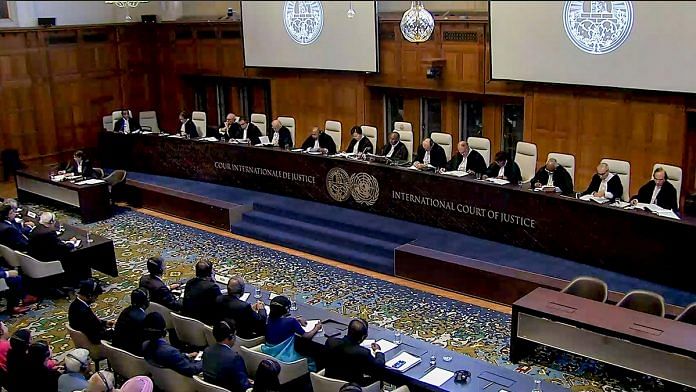New Delhi: In a scathing critique of the Aung San Suu Kyi-regime in Myanmar, the International Court of Justice (ICJ) has called its “state-sponsored violence” against the Rohingyas a “genocide”.
The world court has ordered the Myanmar government to take all possible measures to protect the minority Muslim community from further persecution.
“Genocide is denial of right to life of an entire group. Such denial of right to life shocks the human conscience,” said ICJ President Judge Abdulqawi Ahmed Yusuf Thursday.
The court has also asked the Myanmar government to exercise control over its military and prevent the forces from causing further harm to the Rohingyas. The government has been ordered to take steps that prevent any genocidal evidence from being destroyed.
Myanmar has been instructed to report back to the ICJ regarding the enforcement within four months.
While the ICJ’s judgment is arguably the most pronounced indictment of the Myanmar government and its military, critics have contended that it is a little more than mere criticism. They have argued that the judgment could be “binding” but not enforceable — raising doubts about the safety of Rohingyas in future.
ICJ has the power to adjudicate but lacks institutional authority to force nations to adhere to its judgments.
Also read: Burma was once toast of the world. Now, it is on list of top 10 places to avoid
What is the case against Myanmar
A lawsuit was filed by Gambia in November last year at the ICJ, alleging that Myanmar has carried out mass murders, rapes and arson against the Rohingyas in the country’s Rakhine state, where the ethnic Muslim minority resides.
Gambia was supported by the 57-member Organisation of Islamic Cooperation.
Gambia’s application states that Myanmar’s military began genocidal acts starting October 2016 after a small number of Rohingyas reacted to Myanmar’s persecution and attacked three border guard police posts in northern Rakhine state.
Nearly 7,40,000 Rohingyas have fled the country since 2017 following crackdown by Myanmar’s military. Most of them have been living in camps across the border in Bangladesh.
At a hearing in the ICJ last month, Gambia had argued that Myanmar violated the 1948 United Nations Genocidal Convention. In its petition, the West African nation had demanded that special steps be taken to prevent any future genocidal acts and restrict Myanmar from destroying evidence.
Thursday’s judgment, however, dealt only with Gambia’s request for preliminary measure. ICJ’s final ruling can take years. “Thursday’s ruling dealt only with Gambia’s request for so-called preliminary measures, the equivalent of a restraining order for states,” noted a Reuters report.
Also read: Nobody to claim them, 250 houses India gifted Myanmar for Rohingyas lie vacant
What did the court say
The ICJ had Thursday stated that it has the prima facie jurisdiction to adjudicate on acts of genocide in Myanmar. The 17-member bench had unanimously held that Rohingyas were a “protected group” under the 1948 UN convention.
Judge Yusuf had also pulled up the Myanmar government for insufficient corrective actions.
“The court is of the opinion that steps which [Myanmar] claimed to have taken to facilitate the return of Rohingya refugees present in Bangladesh, to promote ethnic reconciliation, peace and stability in the Rakhine State, and to make its military accountable for violations of international humanitarian and human rights law, do not appear sufficient,” he had said, reading out the judgment.
The court also noted that the remaining 6,00,000 Rohingyas in Myanmar were “extremely vulnerable” to military-led violence. The government was hence instructed to “take all measures within its power” to prevent acts that are prohibited under the 1948 convention.
The ruling ordered Kyi’s government to use its influence over the nation’s military and other groups in order to prevent them from “killing” or “causing serious bodily or mental harm” to the Rohinigyas.
The court also asked the Myanmar government to stop its military from “deliberately” inflicting upon the minority community conditions of life that are intended to bring about its physical destruction — in whole or in part.
Myanmar argues it didn’t commit genocide
On 21 January, two days before the ICJ delivered its judgment, a government-constituted commission in Myanmar had released its findings on the “conduct of military” against “Rohingya insurgents”.
For the first time, a domestic investigation by the country had acknowledged that “war crimes” against Rohingyas had been committed by some military officers. But the probe also argued that there was no evidence of the military having committed genocide.
Hours before the ICJ delivered its judgment, Myanmar’s de facto leader Kyi wrote an opinion piece for The Financial Times. She argued that though war crimes had been committed by the military, there were no acts of genocide against the Rohingyas.
Kyi also demanded that her government be given time to “deliver justice on war crimes”.
Also read: ICJ begins hearings against Myanmar on genocide charges, Aung San Suu Kyi heads defence team



